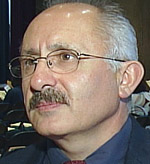According to Turkish writer and publicist Taner Akcham, the books on the Armenian Genocide that have been published until now include the episodic or Western sources regarding the Armenian Cause. In his new book entitled “Shameful Act – the Armenian Genocide and Turkey’s responsibility”, Akcham has first tried to use the archives of the Ottoman Empire and, secondly, approach the issue from the perspective of Turkish national security.
The Armenians were massacred under the name of national security and much later, according to Akcham, Ataturk was ready to recognize the Genocide for the same reason. Even open trials had begun.
“However, after the moment when it became clear that the Treaty of Sevres was inevitable and, especially after the signing of the treaty, public and official apology were seen simply as a sign of defeat,” writes Akcham, who adds that even today there is a special subdivision in the Turkish Security Council on the Armenian Cause. The Armenian Cause remains in the center of attention of Turkish society in the beginning of the 21st century, as it was a century ago.
Despite that, Turkish intellectuals raising their voices about the Armenian Genocide turn into a target for attack. That is why Akcham’s book presentation at the Glendale Public Library was held under strict police supervision. The following is our interview with the Turk writer:
– What happened on the Canadian border February of this year?
– I was invited to participate in a seminar in Canada. When crossing the border, the official kept me for 4-5 hours on the American-Canadian border. At first they did not tell me what the problem was, and only in the end did they show me printed pages from the Wikipedia (a very popular electronic encyclopedia on the Internet-A.A.) where I was qualified as a terrorist. Only after the direct intervention of one of the ministers of Canada did they release me.
– Before our interview, using Google, I found many websites against you, and there were even threats. Do you worry about that?
– Of course, it is very unpleasant to be the target of anti-propaganda. Indeed, I am very worried about that. I would not like to see that, but they are there. I think that that is a very well-organized campaign, aimed at fighting against my books and my views.
– How do you evaluate current Turkish-Armenian relations?
– Turkey has elections coming up, and until the election of the new president on July 21, I don’t think that there will be any changes in the relations between Armenia and Turkey. But Turkey must regulate its relations with Armenia on the road towards EU integration, and first and foremost it must open the border. I am optimistic towards the future of Turkish-Armenian relations, but not short-term, rather in the sense of a long-term perspective.
– In an interview with a Turkish scientist, the latter expressed the opinion that currently there is more of a nationalist mood in Turkey than there was five years ago, and that it is harder to talk calmly about the Armenian Genocide. Do you agree with that evaluation?
– No, I don’t agree. True, there is a certain wave of nationalism, but the Armenian Genocide was not on the agenda of the Turkish public five years ago. Currently it forms part of the democratization movement of Turkey. On one hand, the nationalists coming onto the scene are aggressive. They attack us progressive intellectuals and social activists…But on the other hand there are more and more people involved in the debates on the Armenian Cause. Five years ago it would have been simply impossible to organize a public meeting with 200,000 people who would scream “We are all Armenians, we are all Hrant” (Hrant Dink-A.A.). This is the climax and destiny of Turkish society and, like a litmus test, it can differentiate people who are either for or against democracy.
– Do you feel insecure during your public speeches?
– Yes, in the U.S. They tried to attack me in New York, but they were ultra-extremist national fascists whom I wouldn’t want to compare with the entire Turkish nation. I don’t consider that a big issue and not a big danger.
– Your book presents the chronology, the proofs of the Armenian Genocide and the post-genocide events in Turkey. If we summarize all of this in one paragraph, what is the book entitled “Shameful Act: the Armenian Genocide and Turkey’s responsibility” about?
– If I sum it up in one sentence, Turkey must come face-to-face with its history and take on moral responsibility. That is one of the points of the climax of Turkey’s democratization.

